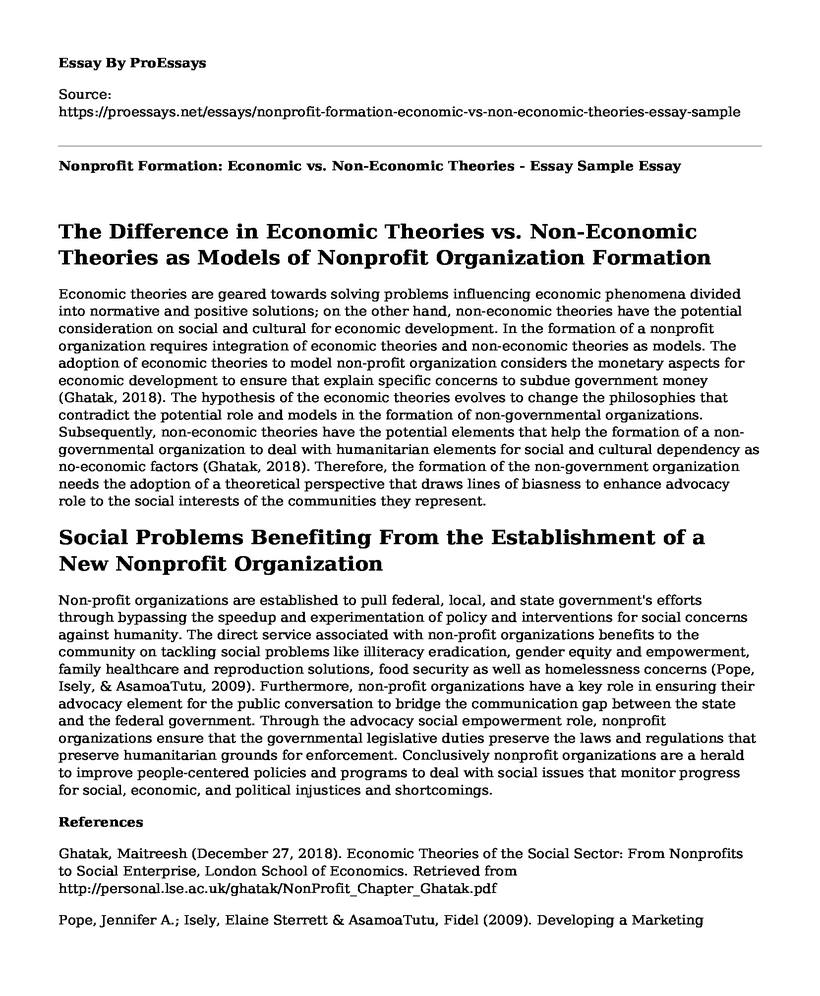The Difference in Economic Theories vs. Non-Economic Theories as Models of Nonprofit Organization Formation
Economic theories are geared towards solving problems influencing economic phenomena divided into normative and positive solutions; on the other hand, non-economic theories have the potential consideration on social and cultural for economic development. In the formation of a nonprofit organization requires integration of economic theories and non-economic theories as models. The adoption of economic theories to model non-profit organization considers the monetary aspects for economic development to ensure that explain specific concerns to subdue government money (Ghatak, 2018). The hypothesis of the economic theories evolves to change the philosophies that contradict the potential role and models in the formation of non-governmental organizations. Subsequently, non-economic theories have the potential elements that help the formation of a non-governmental organization to deal with humanitarian elements for social and cultural dependency as no-economic factors (Ghatak, 2018). Therefore, the formation of the non-government organization needs the adoption of a theoretical perspective that draws lines of biasness to enhance advocacy role to the social interests of the communities they represent.
Social Problems Benefiting From the Establishment of a New Nonprofit Organization
Non-profit organizations are established to pull federal, local, and state government's efforts through bypassing the speedup and experimentation of policy and interventions for social concerns against humanity. The direct service associated with non-profit organizations benefits to the community on tackling social problems like illiteracy eradication, gender equity and empowerment, family healthcare and reproduction solutions, food security as well as homelessness concerns (Pope, Isely, & AsamoaTutu, 2009). Furthermore, non-profit organizations have a key role in ensuring their advocacy element for the public conversation to bridge the communication gap between the state and the federal government. Through the advocacy social empowerment role, nonprofit organizations ensure that the governmental legislative duties preserve the laws and regulations that preserve humanitarian grounds for enforcement. Conclusively nonprofit organizations are a herald to improve people-centered policies and programs to deal with social issues that monitor progress for social, economic, and political injustices and shortcomings.
References
Ghatak, Maitreesh (December 27, 2018). Economic Theories of the Social Sector: From Nonprofits to Social Enterprise, London School of Economics. Retrieved from http://personal.lse.ac.uk/ghatak/NonProfit_Chapter_Ghatak.pdf
Pope, Jennifer A.; Isely, Elaine Sterrett & AsamoaTutu, Fidel (2009). Developing a Marketing Strategy for Nonprofit Organizations: An Exploratory Study, Journal of Nonprofit & Public Sector Marketing, 21:2, 184 201, DOI: https://doi.org/10.1080/10495140802529532
Cite this page
Nonprofit Formation: Economic vs. Non-Economic Theories - Essay Sample. (2023, Feb 15). Retrieved from https://proessays.net/essays/nonprofit-formation-economic-vs-non-economic-theories-essay-sample
If you are the original author of this essay and no longer wish to have it published on the ProEssays website, please click below to request its removal:
- Esay Sample on Unemployment
- Patient Satisfaction Survey: Data Collection Paper Example
- Self-Interest Threat - Essay Sample
- Competency Model: Recruiting and Hiring Process at Capra Tek - Essay Sample
- Employee Health: Promoting Safety and Well-Being in the Workplace - Research Paper
- GDP: Explained - Key for Economic Activity & Development - Essay Sample
- Change Management: Crafting an Organized Approach for Success - Free Essay







